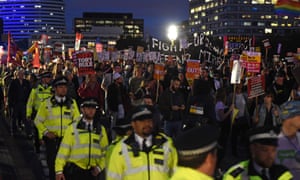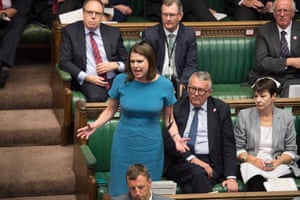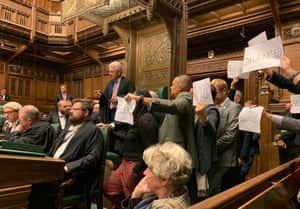Fri 13 Sep 2019 05.00 BST
by Jon Henley Europe correspondent

Boris Johnson’s decision to suspend parliament for five weeks triggered angry protests across the UK. Photograph: Oli Scarff/AFP/Getty Images
It was a quiet summer, albeit punctuated by the repeated pledges of Boris Johnson to take Britain out of the EU “do or die” – deal or no deal – on 31 October. Then quite suddenly, Britain’s long-running Brexit drama turned into a crisis.
The new prime minister found himself cornered: shorn of a Commons majority, obliged by furious MPs to beg for a Brexit extension he has sworn never to request, and prevented from calling the snap election he urgently wanted.
Parliament, meanwhile, was – perhaps unlawfully – suspended until 14 October, preventing MPs from discussing all this until three days before the crunch EU summit at which Brexit’s fate could be decided and a fortnight before the current exit date.
How did all this play out, what does it mean and where might it go from here? If you’re blindsided or even just bewildered by the latest unlikely plot twists in the interminable saga of Britain’s efforts to leave the EU, this is for you.
How did it all kick off?
The first hint the Brexit beast might have been about to wake from its slumber came in late August, after the new government – made up mostly of hardcore believers, unlike its predecessor – had spent the early summer hammering home its core message and promising that “whatever the circumstances”, Britain would leave the EU on the new Brexit deadline of 31 October.
Having decided – narrowly – in June 2016 that Britain should depart the EU, voters had offered no guidance as to the destination: a soft Brexit, remaining close to the EU; a hard Brexit, distancing itself from the bloc; or no deal at all.
Theresa May’s government thought it knew what voters wanted, and negotiated with the EU27 the only exit deal possible given a series of red lines she had already laid down. Parliament, however, had other ideas, refusing to endorse the deal and forcing the UK to delay its planned departure.
After MPs rejected the withdrawal agreement in three successive votes but proved unable, over many months, to decide on any alternative course of action, May gave up. And in came Johnson.
The problem, said the new prime minister, was that the Brexit deal contained the infamous Irish backstop, the mechanism to avoid a return to a hard border between Northern Ireland and the Republic of Ireland. It was “undemocratic”, he said, and had to go.
The UK would, of course, far prefer to leave with a deal, but it would not hesitate to leave without one – and no amount of Commons votes, or even an election campaign, would change its mind. It was up to “our friends and partners” in the EU to budge.
But after spending nearly two painstaking years negotiating the 577 pages of Theresa May’s deal and having always said it could not be reopened, the EU did not believe Johnson wanted a deal. His “central scenario”, European diplomats were told, was to crash out.
And that is where things stood – a fraught standoff in an essentially phoney war – on 28 August, when the prime minister suddenly announced he had asked the Queen to suspend parliament for five weeks, from early September to mid-October.
And it all, for want of a better term, kicked off.
An unprecedented 10 days
Suspension, or prorogation, is normal in between governments; it usually lasts a couple of weeks. It is not normal for five weeks, little more than 50 days before arguably the most momentous event in the country’s history since the second world war.

Boris Johnson and his special advisor Dominic Cummings leave from the rear of Downing Street before heading to the Houses of Parliament on 3 September. Photograph: Daniel Leal-Olivas/AFP/Getty Images
Unless steps were taken beforehand, on 31 October the UK would, with enormous consequences, crash out of the EU without a deal. Opposition and rebel Tory MPs assumed Johnson wanted to stop parliament stop him doing what he wanted. They were outraged.
With a window of barely a week before prorogation kicked in, Labour, the Liberal Democrats, the Scottish National party, Plaid Cymru and the Greens joined forces with 21 doughty Tory objectors, including two former chancellors and Winston Churchill’s grandson.
Amid nationwide public protests, Johnson and his cabinet tried to head them off, refusing to rule out simply ignoring any anti no-deal law, and threatening to expel from the Conservative party any rebels who dared vote for one. It didn’t stop them. His opponents declared parliamentary war.
Together, they voted to seize control of the parliamentary agenda on the first full day after the summer recess and, then in a series of remarkable votes, rammed through a bill forcing Johnson to ask the EU for another extension – he said he would rather “die in a ditch” – if there was still no agreed Brexit deal by mid-October.

Liberal Democrat leader Jo Swinson during Prime Minister’s Questions in the House of Commons on 4 September Photograph: Jessica Taylor/UK Parliament
Many of the Conservative rebels said their resolve had been strengthened rather than shaken by the prime minister’s bullying. Their subsequent sackings – by text message– enraged moderate Conservatives who lamented what they called the transformation of their previously broad-church party into a narrow, extremist Brexit sect.
Within a week of parliament’s return, Johnson had suffered an unprecedented six consecutive parliamentary defeats, including two on motions of his own demanding an early election: perhaps not surprisingly, his rebel purge having left him with a majority of minus 41, he failed to get the required two-thirds of MPs’ votes.
Rebel and opposition MPs alike by now had so little trust in Johnson that they refused to allow any fresh elections until they were sure an extension had been secured and a no-deal Brexit on 31 October ruled out. Even his own brother, Jo, quit the cabinet, citing a conflict between “family loyalty and the national interest”.

MPs protest in the House of Commons as parliament is suspended. Photograph: Clive Lewis/Parliament
Amid unprecedented scenes in parliament, the prime minister on Monday went ahead with his decision to suspend parliament until 14 October. But there was one more twist: sensationally, Scottish judges declared his move was aimed at silencing parliament and was therefore unlawful. The supreme court will rule next week.
So what happens now?
Not for the first time in the Brexit saga, that is the £350m-a-week question. Britain is certainly – again not for the first time – an international laughing stock. But where we go from here is still not much clearer than it was before that long, quiet summer. Commentators see four main options.
First, Johnson could still get a deal, perhaps by agreeing to the EU’s original proposal to resolve the Ireland problem: creating a border in the Irish sea. Winning parliamentary approval would be very hard, but perhaps possible – Labour MPs in leave-voting constituencies want to deliver, and Tory hardliners may see this as their last chance.
Second, he could break his promise, request an extension and then immediately demand an election, counting on a fiercely anti-EU, people-versus-parliament campaign to see him through. This could, however, leave him vulnerable to a squeeze from both the Brexit party and (possibly) a coordinated opposition promising a second referendum.
Third, he could go full no deal on 31 October as he promised, ignoring the law (or at least testing it to its limits in the courts). He could then call an early election after the UK leaves the EU, trusting that with Brexit delivered, the Brexit party will be no more – and hoping that no deal is not so catastrophic that the country does not give him a kicking.
Finally, he could be pushed out by a no-confidence vote or step down of his own accord. Rather than the divisive Jeremy Corbyn, a more neutral figure (Ken Clarke?) might then head up a temporary government whose sole purpose would be to ask the EU for an extension. Elections would then follow which, if he campaigned for no deal, Johnson could conceivably win.
Will the EU27 play ball? They are, certainly, rapidly running out of patience. Most now would really like the UK just to go as soon as possible. They will never throw Ireland under the bus by ditching the backstop - but if no deal could still be avoided, they would be pleased.
A good reason (elections, a new government) would be needed, but it is hard to see even Emmanuel Macron refusing a request for an extension intended to avoid no deal.
No one wants to be seen to be actively helping the UK over the cliff edge.